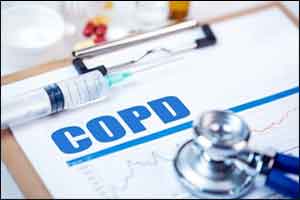- Home
- Editorial
- News
- Practice Guidelines
- Anesthesiology Guidelines
- Cancer Guidelines
- Cardiac Sciences Guidelines
- Critical Care Guidelines
- Dentistry Guidelines
- Dermatology Guidelines
- Diabetes and Endo Guidelines
- Diagnostics Guidelines
- ENT Guidelines
- Featured Practice Guidelines
- Gastroenterology Guidelines
- Geriatrics Guidelines
- Medicine Guidelines
- Nephrology Guidelines
- Neurosciences Guidelines
- Obs and Gynae Guidelines
- Ophthalmology Guidelines
- Orthopaedics Guidelines
- Paediatrics Guidelines
- Psychiatry Guidelines
- Pulmonology Guidelines
- Radiology Guidelines
- Surgery Guidelines
- Urology Guidelines
Triple therapy lowers exacerbation rate in COPD : BMJ

A new study published in the journal The BMJ reports that the use of triple therapy resulted in a lower rate of moderate or severe exacerbations of COPD, better lung function, and better health-related quality of life than dual therapy or monotherapy in patients with advanced COPD.
Yayuan Zheng and associates conducted a study to compare the rate of moderate to severe exacerbations between triple therapy and dual therapy or monotherapy in patients with chronic obstructive pulmonary disease (COPD).
Read Also: FDA approves once-daily, inhalation solution for COPD
The meta-analysis included 21 trials (19 publications). Triple therapy consisted of a long-acting muscarinic antagonist (LAMA), long-acting β agonist (LABA), and inhaled corticosteroid (ICS).
The key study findings included are:
- Triple therapy was associated with a significantly reduced rate of moderate or severe exacerbations compared with LAMA monotherapy, LAMA, and LABA (0.78, 0.70 to 0.88), and ICS and LABA (0.77, 0.66 to 0.91).
- Trough forced expiratory volume in 1 second (FEV1) and quality of life was favorable with triple therapy.
- The overall safety profile of triple therapy is reassuring, but pneumonia was significantly higher with triple therapy than with dual therapy of LAMA and LABA (relative risk 1.53).
"In this meta-analysis of 21 trials, we found that triple therapy (of LABA, LAMA, and inhaled corticosteroids combined) was associated with a significantly larger reduction in the rate of moderate or severe COPD exacerbations than dual therapy (of LAMA and LABA, or inhaled corticosteroids and LABA) or monotherapy (LAMA only). Surrogate outcomes such as spirometry (FEV1) and quality of life (SGRQ score) were favorable, and the overall safety profile of triple therapy is reassuring, but pneumonia was significantly higher with triple therapy than with dual therapy of LAMA and LABA, "write the authors.
Read Also: Adding theophylline to ICS does not reduce exacerbations in COPD
Chronic obstructive pulmonary disease (COPD) represents one of the most important public health challenges because of its high prevalence and related disability and mortality. Management of COPD mainly relies on inhaled drugs, including inhaled corticosteroids, long-acting β2 adrenoceptor agonists (LABA), and long-acting muscarinic receptor antagonists (LAMA). Pharmacological management of COPD tends to begin with monotherapy, and step up to dual or triple therapy, as necessary, to control symptoms.

Disclaimer: This site is primarily intended for healthcare professionals. Any content/information on this website does not replace the advice of medical and/or health professionals and should not be construed as medical/diagnostic advice/endorsement or prescription. Use of this site is subject to our terms of use, privacy policy, advertisement policy. © 2020 Minerva Medical Treatment Pvt Ltd